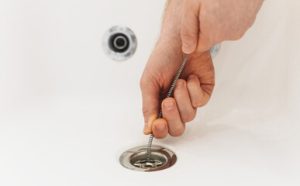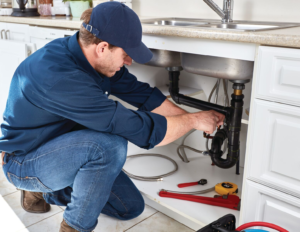Clogged drains are more than just a nuisance, they can spread foul odors throughout the home and can lead to structural damage. Instead of pouring chemical cleaners down your drain, try using baking soda and vinegar to maintain a healthy drainage system.

However, some clogs are beyond the scope of this DIY approach. That’s when a professional plumber comes in handy with their drain cleaning tools. Contact Drain Cleaning Perth for professional help.
Clogs can be a bit of a turn-off, with their closed-off connotations. But when crafted in the right material, they can look just as cool and edgy as they do cozy and practical. In fact, the humble wooden footwear style has exploded onto runways (Chloe notably ignited a craze with its viral Fall 2024 show, featuring clog-inspired mule flats) and are now a key part of experimental outfits. Whether you prefer to wear yours with barrel jeans, Boho ruffled dresses or scrunched-up socks, there’s now a pair of clogs for every outfit. Here, we’ve curated the best of the bunch.
Mineral Deposits
Mineral deposits are of great economic importance because they are the source of many important industrial metals and energy resources. Among the most valuable are coal, oil, and natural gas, but iron, gold, silver, copper, lead, zinc, and other metals are also used extensively in construction materials and in the manufacture of consumer goods. In addition, minerals are essential components of a variety of chemical products, including pharmaceuticals, fertilizers, and paints.
A layered geologic formation composed of sediments or rock material which is confined to a narrow belt and is separated from adjacent beds by faulting. It is also characterized by the presence of a gossan zone and by the existence of pyrite in its sulfide-rich zones. Pyrite is often a useful indicator of the presence of ore deposits.
The mineral deposits section is concerned with the origin and development of all types of metallic and nonmetallic deposits at all scales from the microscopic to district-level and beyond, using both standard and new approaches. The section invites contributions in all areas of mineral deposit studies, from descriptive models to genetic ones, at both global and local scales.
Deposits may form through magmatic, hydrothermal, or sedimentary processes, and the minerals can be concentrated in a number of different ways. Magmatic processes may precipitate the metals from a magma as it cools and crystallizes, or they may form in hydrothermal systems such as hot springs and geysers, where hot water rich in dissolved minerals flows through volcanic or sedimentary rocks.
Hydrothermal fluids can also concentrate minerals in aqueous sedimentary environments, where they may replace existing ones or precipitate from the pore spaces of sedimentary rocks. Examples include sulfide-containing deposits such as galena (lead sulfide), sphalerite (zinc sulfide), and chalcopyrite (copper-iron sulfide). Sedimentary processes can concentrate mineral particles in the pore spaces of sedimentary rocks, where they may accumulate to a concentration such as those found in tin sandstones or gold placers.
The most common mineral deposits are sulfide-rich stratabound deposits formed when scavenged ore from hot groundwater seeps through unconsolidated lake or ocean sediments and precipitates out of solution as sulfide minerals such as galena, sphalerite, and chalcopyrite. The sulfides are usually concentrated in pore spaces between grains of the sedimentary rock and thus are termed stratabound mineral deposits.
Commercial Drains
Commercial drains are designed to handle a higher volume and different types of waste than residential drains. The drains in a restaurant kitchen, for example, must efficiently manage grease and food particles. If these materials aren’t properly managed, they can wreak havoc on a restaurant’s plumbing system and lead to costly repairs and downtime. By regularly cleaning commercial drains, restaurants can prevent these issues and maintain a functioning and productive facility.
Regularly Cleaning Drains
Whether you operate a restaurant, commercial office, or industrial factory, keeping your drains clean is essential for maintaining a functional and productive business. Clogged drains can cause foul odors, water backups, and floods that can interfere with daily operations and lead to lost revenue. Regular drain cleaning can reduce the risk of these problems and extend the lifespan of your drains.
The most effective way to keep your commercial drains clean is to implement a maintenance routine that includes frequent inspections, routine cleaning, and educating employees on proper waste disposal practices. Additionally, installing drain covers and grates can help prevent foreign debris from entering the drains.
Professionals use a variety of tools and techniques to clear drain clogs. One common tool is a plumbing snake, which is a flexible cable with a specialized head that can reach deep into the pipes and break up blockages. Alternatively, chemical cleaners can be used, but they should be used sparingly since they can damage your pipes over time.
To maintain the health of your drains, regularly flush them with hot water. This simple step can eliminate foul odors and wash away loose dirt, helping to prevent future blockages. For high-traffic areas, you may want to perform this task daily or weekly. For low-traffic areas, a monthly flush may be sufficient. Another important tip is to regularly maintain the levels of your P Traps, which are designed to hold water and stop sewer gas from wafting into the building. By pouring water into the traps at least once a month, you can prevent them from becoming full and clogged.
Preventative Maintenance
A clogged drain can cause more than just an inconvenience. The stagnant water can become a breeding ground for bacteria, creating health and safety risks. Severe blockages can also require expensive repairs. Preventative maintenance can prevent these problems from occurring in the first place.
Routine drain cleaning prevents the buildup of hair, soap scum, grease, and food particles. This keeps the drains clear and ensures smooth water flow, reducing the strain on the plumbing system. It can also help keep unpleasant odors from developing in the home.
It’s important to remember that even if you’re careful with what goes down the drain, there are still many substances that can build up and lead to a clog. A professional can identify early warning signs, like slow draining water or water backing up through the sink, and provide preventative cleaning services to ensure that your drainage system is working properly.
While one small plumbing problem may not seem like a big deal, it can quickly turn into a major issue that disrupts your daily routine and wreaks havoc on your home. Regular preventative maintenance can reduce the risk of emergency repairs and save homeowners and businesses a lot of money in the long run.
In addition to preventing drain blockages, preventative maintenance also helps extend the lifespan of your plumbing and sewer systems. Regular inspections and cleanings can identify minor issues and address them before they develop into major problems, saving a lot of time and money.
